#guide (1965)
Explore tagged Tumblr posts
Text





Guide (1965) | dir. Vijay Anand
#guide#guide 1965#vijay anand#dev anand#indian cinema#hindi cinema#bollywood#cinema#movies#films#world cinema#classic cinema#old bollywood#cinematography#1960s#south asian cinema#asian cinema#indian movies#bollywood movies#hindi movies#aesthetics#aesthetic#cinephile#indian films#bollywood films#hindi films#classic bollywood#film#movie#screencaps
26 notes
·
View notes
Text
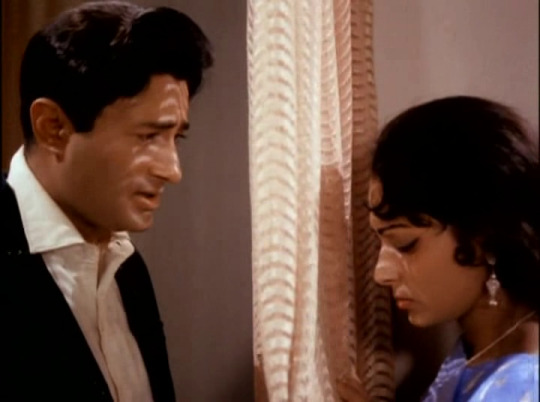
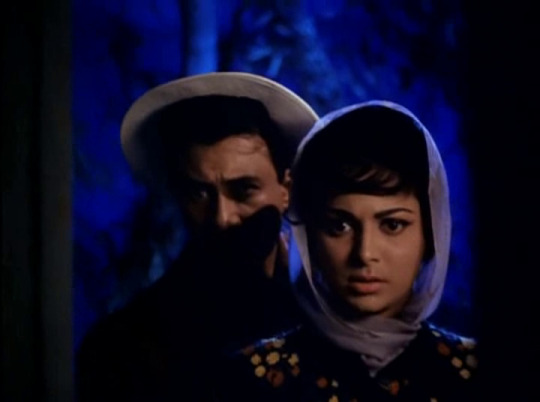
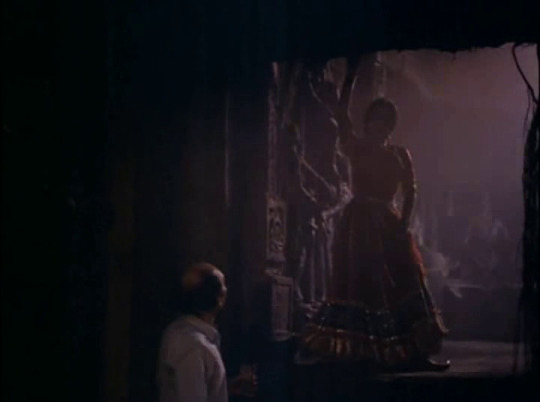
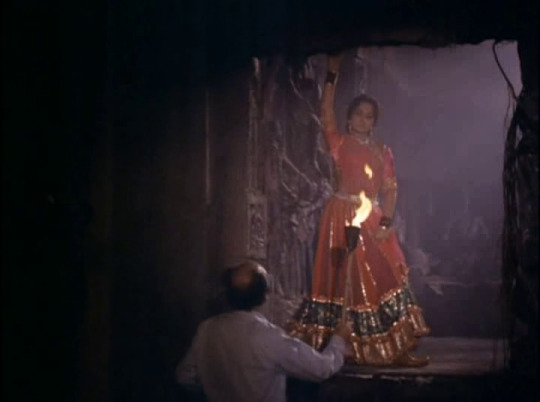
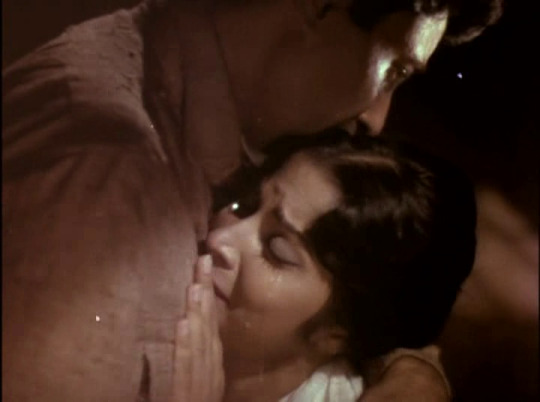
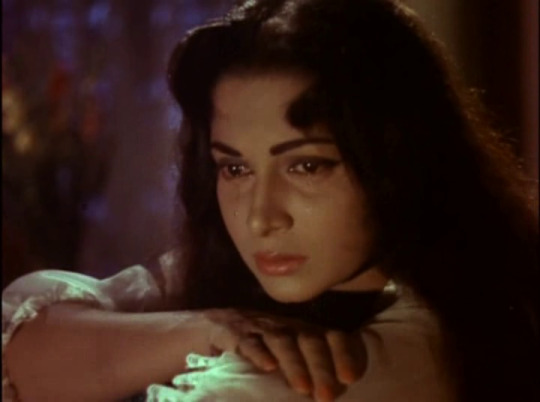
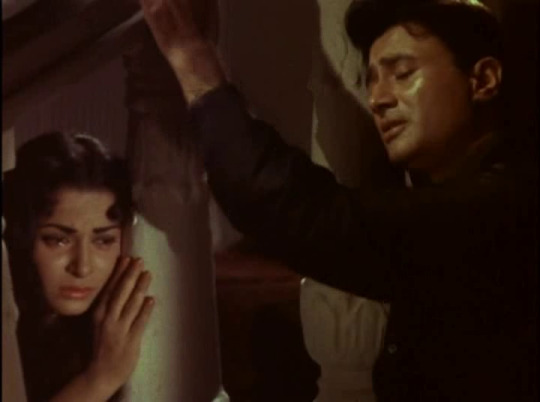
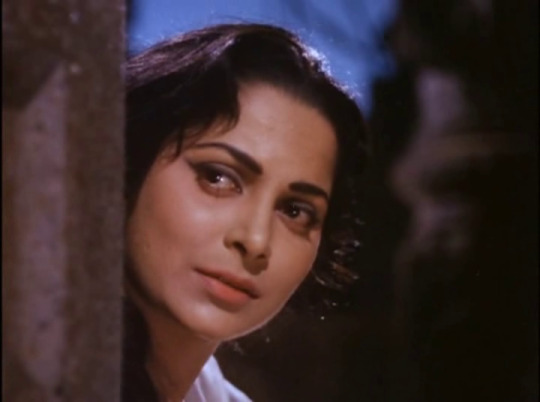
Waheeda Rehman and Dev Anand in Guide (1965)
#waheeda rehman#dev anand#bollywood#bollywood movie#60s#hindi movie#bollywood classic#guide#guide 1965
44 notes
·
View notes
Text
On Waheeda Rehman's 87th birthday, Filmfare shares an old profile piece:




"Waheeda Rehman and Shashi Kapoor must be the only two Bombay stars who do not own a TV set. Waheeda hasn't bought one because she fears that her two growing young children will keep watching it neglecting their studies, but she and her family do sometimes go over to the Yash Chopras' to watch a movie on video."
Happy birthday to the most talented and gorgeous actress I've ever witnessed in cinema!
5 notes
·
View notes
Text

TV Guide - March 13 - 19, 1965
The Cartwrights of Bonanza
Michael Landon (born Eugene Maurice Orowitz; October 31, 1936 – July 1, 1991) Actor, writer, director, and producer. He was known for his roles as Little Joe Cartwright in Bonanza (1959–1973), Charles Ingalls in Little House on the Prairie (1974–1983), and Jonathan Smith in Highway to Heaven (1984–1989). Landon appeared on the cover of TV Guide 22 times, second only to Lucille Ball. (Wikipedia)
Lorne Hyman Greene, OC (born Lyon Himan Green; 12 February 1915 – 11 September 1987) Actor, radio personality and singer.
His television roles include Ben Cartwright on the western Bonanza, and Commander Adama in the original science fiction television series Battlestar Galactica and Galactica 1980. He also worked on the Canadian television nature documentary series Lorne Greene’s New Wilderness, and in television commercials. (Wikipedia)
Bobby Dan Davis Blocker (December 10, 1928 – May 13, 1972) Film and television actor and Korean War veteran, who played Hoss Cartwright in the long-running NBC Western television series Bonanza. (Wikipedia)
Pernell Elven Roberts Jr. (May 18, 1928 – January 24, 2010) Stage, film and television actor, as well as a singer. In addition to guest-starring in over 60 television series, he was best known for his roles as Ben Cartwright’s eldest son Adam Cartwright on the Western television series Bonanza (1959–1965), and as chief surgeon Dr. John McIntyre, the title character on Trapper John, M.D. (1979–1986). (Wikipedia)
44 notes
·
View notes
Text
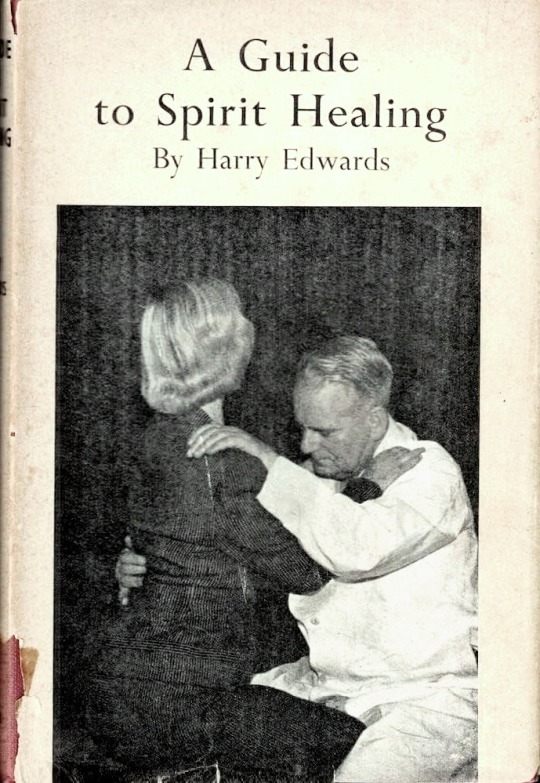
Harry Edwards - A Guide To Spirit Healing - Spiritualist Press - 1965
#witches#healers#occult#vintage#a guide to apirit healing#spiritualism#spiritualists#spiritualist press#harry edwards#1965#spirit healing
97 notes
·
View notes
Text



12 notes
·
View notes
Text
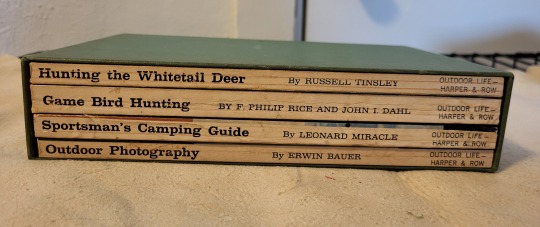
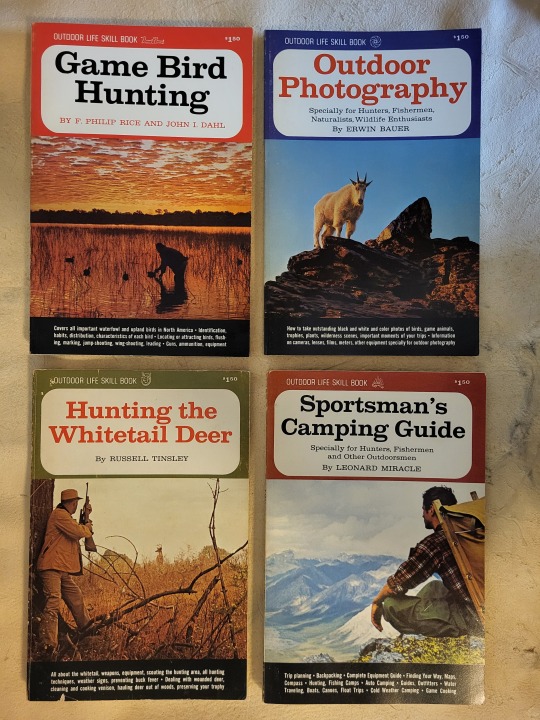
Four Outdoor Life Skill Books, all paperback, with a hardcover case for the set
Outdoor Photography: Specially for Hunters, Fishermen, Naturalists, Wildlife Enthusiasts, by Erwin Bauer, 1965
Sportsman's Camping Guide: Specially for Hunters, Fishers, and Other Outdoorsmen, by Leonard Miracle, 1965
Game Bird Hunting, by F. Philip Rice and John I. Dahl, 1965
Hunting the Whitetail Deer, by Russell Tinsley, 1965
#books#my library#outdoor life skill book#outdoor photography#erwin bauer#1965#1960s#sportsmans camping guide#leonard miracle#game bird hunting#f philip rice#john i dahl#hunting the whitetail deer#russell tinsley#hunting book#hunting#camping#camping book#photography#photography book#nature photography#deer hunting#game bird#bird hunting#outdoor life book
21 notes
·
View notes
Text

Remembering actor-filmmaker-screenwriter Kishore Sahu on his birth anniversary (22/11). Kishore Sahu was a famed actor, film director, screenwriter, and producer in Hindi cinema. You’d probably remember him as Waheeda Rehman’s husband, Marco, in Vijay Anand's Guide (1965).
In this photo, he is with Talat Mahmood, music director Chitragupt, and Lata Mangeshkar.
2 notes
·
View notes
Photo

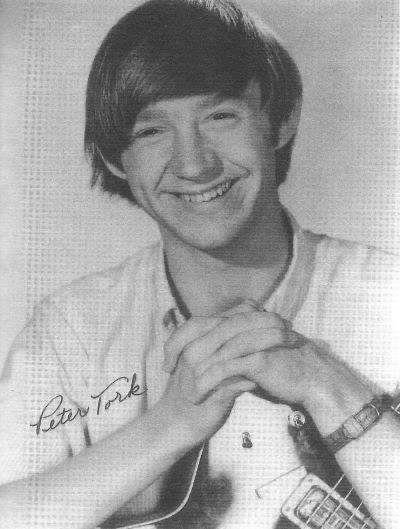
Peter Tork, 1964 (photo by Bob Campbell); and 1965.
“When Peter flunked out of college, he went to New York, where he sang and played in pass-the-hat coffee houses. After a tour as an accompanist for the Phoenix Singers, he came to Los Angeles (‘I’d had it up to here with the Village, so when someone offered to put me up out here, I came. I worked around Long Beach as a kitchen boy and accompanist for different groups. When I heard about the ad in Variety, I didn’t want to go, but I had let my hair grow in the Village, so I was ready for the part. Now I’m glad. When The Monkees made a personal appearance in New York, and the girls screamed, “It’s them!”, it was thrilling. And now my parents are proud of my success. The last time I went home, I lorded it over the other kids. My little sister doesn’t even think of me as her brother any more - she thinks of me as a TV star.’) Peter’s father, Prof. H. John Thorkelson, says, ‘Naturally, we were disturbed when he went to Greenwich Village. But we always felt he should do what he wanted to do. However, we always thought he was college material.’” - TV Guide, January 28, 1967
“Peter Tork's ticket to stardom was definitely marked ‘round trip.’ Eight years ago he would pass the hat around an old folk's club and hope that it would come back full. Most of the time it didn't, so to pay the rent his folks sent him a few bucks every month. A few years ago money was the last thing on his mind: he was making hundreds of thousands of dollars and singing to millions, screaming millions. Today he dreams of $60 days as a street singer in San Francisco’s Ghiradelli Square, but they never happen. So last month his mother paid his dental bill. He spends most of his time now as one of over thirty choir members, who think of him as ��Mr. Show Biz’... but he’s not. A few years ago he was one of four... and people thought he was dumb... but he wasn't. He was another Greenwich Village folkee in the days when there were a lot of Greenwich Village folkees. He worked there for three years singing and accompanying groups like the Phoenix Singers and he might still be back there today if it weren’t for Steven Stills. The producers of this T.V. show liked Steven Stills fine, his music and everything. Everything except his screen test. He wasn’t, in their words, photogenic enough. So they asked him if he knew anybody who was like him that photographed a little better. Steven Stills told them about this kid in the Village he knew who looked a little like him. Peter Tork. Peter Tork went down and got the part that Steve Stills almost had. Peter Tork became a Monkee. Each Monkee was allowed to create his own image. Michael Nesmith’s was that of a wise old country boy. Davy's was cool, cute and English. Micky was crazy and wild. Peter was dumb. It was an image he carefully nurtured and developed on the Greenwich Village stage. He found it easy humor. And he used it. One step behind the others. Smiling through it all. Peter drifts away amidst memories of those good times: ‘I was happy to be playing as a Monkee so I would allow myself to pretend that I was happy pretending I was playing.’” - San Diego Reader, December 6, 1973
Times: “Is the Monkees character something you came up with it? Or did they tell you to play him dumb?” Peter Tork: “It's a character I came up with during the personality tests, those black and white bits we did. It was a character I created on the Greenwich Village folk stages basically to protect myself from the crushing silence of a bad joke.” - St. Petersburg Times, June 23, 2000
#Peter Tork#Tork quotes#early 1960s#60s Tork#1960s#<3#70s Tork#00s Tork#Fairfax Street Choir#Phoenix Singers#The Monkees#Monkees#long read#love his mind#1964#1965#TV Guide#San Diego Reader#St. Petersburg Times#can you queue it
17 notes
·
View notes
Text


Waheeda Rehman in Guide, (1965).
1 note
·
View note
Text

#the slang in this book from 1965 is so cool#they call a rush a flash#it's about recovery but here is an illustrated how to guide lol ok
0 notes
Photo





Guide (1965) // dir. Vijay Anand // d.o.p. Fali Mistry
Wahan kaun hai tera
[ Whom do you have there? ]
Musafir jayega kahan
[ Traveller where will you go? ]
#guide#guide 1965#vijay anand#dev anand#fali mistry#r. k. narayan#r k narayan#indian cinema#hindi cinema#cinema#films#movies#film scenes#movie scenes#screencaps#cinematography#bollywood#old bollywood#bollywood movies#classic bollywood#classic cinema#world cinema#indian films#indian movies#hindi films#1965#1960s#1960s cinema#1960s films#1960s movies
19 notes
·
View notes
Text

Guided by the light, by Marek Rużyk (1965-)
485 notes
·
View notes
Text
Writing Notes: Fictional Culture
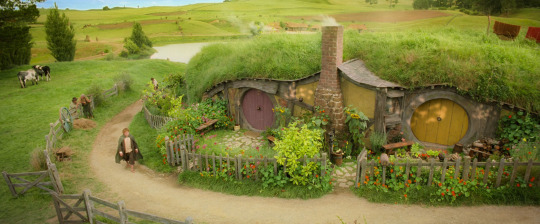
Fictional culture - an essential piece of worldbuilding in certain genres of fiction—particularly in science fiction and fantasy.
Storytellers develop fictional cultures in a variety of mediums, including film, television, short stories, novels, and video games.
A fictional culture is defined by the customs, languages, values, and symbols of an imaginary world.
How to Create a Fictional Culture
Although there are nearly endless possibilities, consider some of these general writing tips for creating a fictional culture.
Pull inspiration from the real world. Pay attention to the cultural behaviors within your society. Broaden your own cultural perspective by researching the ideas and values of different cultures throughout history. Use real-life cultural examples to inform your fictional world, but be wary of repurposing existing cultures or perpetuating stereotypes.
Build off your main character. Develop the setting of your story based on how it serves the character development of your protagonist. Build a culture that highlights or contradicts your main character’s goals, needs, and fears.
Develop a belief system. Consider the core values, social norms, and taboos of your fictional culture. A central belief system can guide how you create rituals, symbols, and artifacts within your story.
Create a social structure. Develop how the family structures and social hierarchies work within your fictional culture. Decide where your main character falls within the social structure. Monetary systems can change your social structure depending on whether you use a bartering economy or something more complex.
Construct a technological system. Determine how advanced the technology is in your fictional culture. The technology of your story will impact the entertainment, communication, and modes of transportation within your fictional world.
Write a brief history. Expand your culture by writing a brief mythology of your fictional society. Avoid overwriting, and keep your history contained to important information that can impact your story.
Examples of Fictional Cultures
To learn more about how fictional cultures work in fiction, explore the following examples.
The Lord of the Rings by J.R.R. Tolkien (1954): Tolkien created a wide variety of fictional cultures to inhabit Middle-earth. Each culture has its own language, value system, and history.
Brave New World by Aldous Huxley (1932): In his dystopian novel, Aldous Huxley developed a complex and technologically advanced culture with distinct social classes.
Dune by Frank Herbert (1965): Dune is an influential sci-fi novel with several detailed fictional cultures. One of them is the Fremen culture, which revolves around ancient superstitions and a rare commodity known as the Spice Melange.
The Fifth Season by N. K. Jemisin (2015): In this award-winning novel, Jemisin created a complex social structure with many "use-castes” that all have a place on an earthquake-ridden planet with one supercontinent.
Source ⚜ More: Notes & References ⚜ Writing Resources PDFs
#culture#worldbuilding#writing tips#writeblr#literature#writers on tumblr#writing reference#dark academia#spilled ink#writing prompt#writing advice#light academia#on writing#writing inspiration#writing ideas#creative writing#writing resources
396 notes
·
View notes
Photo
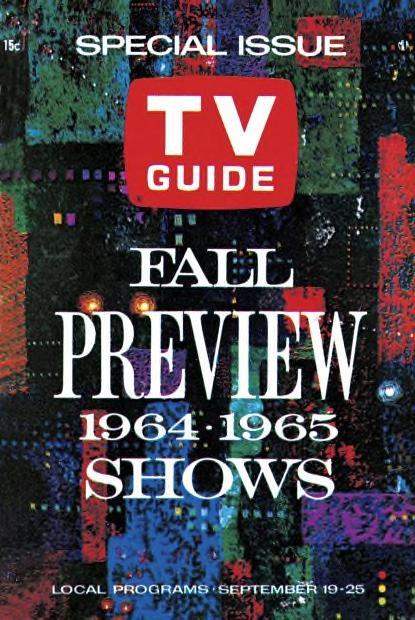
TV Guide - September 19 - 25, 1964
Fall Preview: 1964 - 1965 Shows
ABC
12 O'Clock High (September 18, 1964 – January 13, 1967)
ABC Scope (November 11, 1964 – March 2, 1968)
The Addams Family (September 18, 1964 – April 8, 1966)
Bewitched (September 17, 1964 – March 25, 1972)
The Bing Crosby Show (September 14, 1964 – April 19, 1965)
Broadside (September 20, 1964 – May 2, 1965)
F.D.R. (January 8, 1965 - July 23, 1965)
Jonny Quest (September 18, 1964 – March 11, 1965)
The King Family Show (January 23, 1965 – September 10, 1969)
Mickey (September 16, 1964 – January 13, 1965)
No Time for Sergeants (September 14, 1964 – May 3, 1965)
Peyton Place (September 15, 1964 – June 2, 1969)
Shindig! (September 16, 1964 – January 8, 1966)
The Tycoon (September 15, 1964 – April 27, 1965)
Valentine's Day (September 18, 1964 – May 7, 1965)
Voyage to the Bottom of the Sea (September 14, 1964 – March 31, 1968)
Wendy and Me (September 14, 1964 – May 24, 1965)
CBS
The Baileys of Balboa (September 24, 1964 – April 1, 1965)
The Cara Williams Show (September 23, 1964 – April 21, 1965)
The Celebrity Game (April 6, 1964 - September 13, 1964 / April 8, 1965 - September 9, 1965)
The Entertainers (September 25, 1964 –March 27, 1965)
Fanfare (June 19, 1965 - September 11, 1965)
For the People (January 31 – May 9, 1965)
Gilligan's Island (September 26, 1964 – April 17, 1967)
Gomer Pyle, U.S.M.C. (September 25, 1964 – May 2, 1969)
Many Happy Returns (September 21, 1964 – April 12, 1965)
Mr. Broadway (September 26 – December 26, 1964)
The Munsters (September 24, 1964 – May 12, 1966)
My Living Doll (September 27, 1964 – March 17, 1965)
On Broadway Tonight (July 8, 1964 - March 12, 1965)
Our Private World (May 5 – September 10, 1965)
The Reporter (September 25 – December 18, 1964)
World War One (September 22, 1964 - April 18, 1965)
NBC
90 Bristol Court (October 5, 1964 - January 4, 1965)
Branded (January 24, 1965 – September 4, 1966)
Cloak of Mystery (May 11 - August 8, 1965)
Daniel Boone (September 24, 1964 – May 7, 1970)
The Famous Adventures of Mr. Magoo (September 19, 1964 – April 24, 1965)
Flipper (September 19, 1964 – April 15, 1967)
Harris Against the World (October 5, 1964 - January 4, 1965)
Hullabaloo (January 12, 1965 – August 29, 1966)
International Showtime (September 15, 1961 - September 10, 1965)
Karen (October 5, 1964 – April 19, 1965)
Kentucky Jones (September 19, 1964 – April 10, 1965)
The Man from U.N.C.L.E. (September 22, 1964 – January 15, 1968)
Moment of Fear (May 19 - September 15, 1964 / 25 May 25 - August 10, 1965)
NBC Wednesday Night at the Movies (September 16, 1964 - September 8, 1965)
Profiles in Courage (November 8, 1964 – May 9, 1965)
The Rogues (September 13, 1964 – April 18, 1965)
Tom, Dick and Mary (October 5, 1964 - January 4, 1965)
32 notes
·
View notes
Text

Wyndham and Comber Estate, Southwark
1965-67
G.L.C. Department of Architecture and Civic Design
The Alton Estate Mini Guide
156 notes
·
View notes